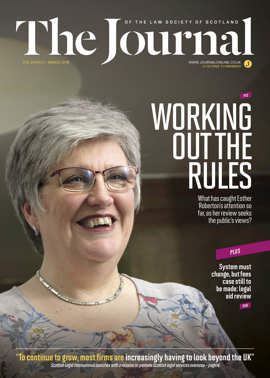Tenant Farming Commissioner: the story so far

The office of Tenant Farming Commissioner (TFC) was established by the Land Reform (Scotland) Act 2016 (LR(S)A), and the relevant sections substantially took effect on 1 April 2017. The first, and current, incumbent is Dr Bob McIntosh. Section 24(1) of LR(S)A contains a list of specific functions of the TFC, such as preparing and promoting codes of practice on agricultural holdings and making inquiries into alleged breaches thereof. These functions must be exercised “with a view to encouraging good relations between landlords and tenants of agricultural holdings”.
Four codes of practice, three guides and one review have been produced, and the Tenant Farming Advisory Forum established. Publications, and information on the forum, are available on the Tenant Farming menu of the Scottish Land Commission website (landcommission.gov.scot/tenant-farming/), together with a guide for persons wishing to report an alleged breach of one of the codes, and an area for publishing the TFC’s decisions on alleged breaches (there are none as yet).
Codes of practice and guides
“Amnesty of Tenants’ Improvements” (June 2017), “Planning the Future of Limited Partnerships” (September 2017), “Sporting Rights” (October 2017), and “The Maintenance of the Conditions of Tenanted Agricultural Holdings” (January 2018) are the four codes of practice which have been issued so far.
They follow the same general structure. The first page lists the industry bodies consulted on, and supporting, the code, sets out the verbs indicating a legal requirement (“must”), a requirement of the code (“should”), and a suggested course of action (“recommend”), and highlights the importance of obtaining professional advice, and the non-partisan role of the TFC. Context is given on the second page. Key principles follow for all but the first code where they are not used. These vary, but the common denominator is regularly meeting for discussions.
The remainder of each code is largely a commonsense guide to reaching an amicable agreement. Reasonable timescales, meeting in person, and keeping records of what is agreed are common features. Parties are signposted to further options where agreement cannot be reached. In keeping with the spirit of the codes, there is an exhortation to use alternative dispute resolution before resorting to litigation, although this is “recommended” rather than a requirement of the code.
A party that considers a code has been breached can seek advice and assistance from the TFC without triggering the formal process. Otherwise, the formal process begins with an inquiry – in the sense of a question – to the TFC, for example: x has occurred; is x a breach of the (specified) code of practice? An inquiry form is provided on the TFC web pages. The process continues with an inquiry – in the sense of an investigation – by the TFC, who will decide whether a breach has taken place. The decision, reasons for it, and any recommendations will be published on the TFC web pages. The TFC has already received a number of inquiries, although not all relate to alleged breaches of a code.
The three guides – unconnected except that all concern some aspect of tenant farming – are to the Land Reform (Scotland) Act 2016, relinquishment of tenancies (ss 110 and 111 LR(S)A, which have yet to be substantially commenced), and features of the modern limited duration tenancy.
Review of tenants' improvements
The TFC has fulfilled his statutory obligation (s 37 LR(S)A) to review the area of tenants’ improvements and report to ministers. The context is that a landlord must pay compensation to an agricultural tenant for certain qualifying improvements, listed in sched 5 to the Agricultural Holdings (Scotland) Act 1991, aspects of which require revision. The TFC has suggested revisions, with a view to reflecting modern practices. Whether to include a future-proof, catch-all clause was considered, and rejected. Ministers must now decide what action to take.
Tenant farming advisory forum
This group, set up by the TFC, will advise him on prioritisation of his work and “identifying barriers to creating a thriving tenant farming sector”. Its membership includes various industry bodies, the TFC and the Scottish Government. Meetings will be every six months, or as required.
The minutes of the first meeting indicate, among other things, a desire for the TFC to issue codes on the general areas covered by the Independent Adviser on Tenant Farming (see www.gov.scot), as well as a code on obligations, and further guidance notes on legislation.
Reviewing rent reviews
Finally, and separate from the TFC’s activities but also part of the implementation of the LR(S)A, the Scottish Government has published a report and recommendations on Testing of the Rent Review System (www.gov.scot), which seeks to identify how objectively and transparently to assess agricultural rents while being fair to both parties. This is a precursor to introducing regulations on rent review.
In this issue
- Borrowings, partner capital and profitability
- GDPR and the cloud
- Employment claims: is the flood still to come?
- Contributory fault: drivers, cyclists and pedestrians
- Reading for pleasure
- Opinion: Derek McCabe
- Book reviews
- Profile: Siobhan Kahmann
- President's column
- Application changes coming
- People on the move
- Seeking a better way
- Beyond borders
- Drawings and profitability
- Enforceable rights or progressive policy goals?
- Conflict theory: it works
- What the liquidators don't tell you
- The office on the move
- Please can we have some more?
- Health check for doctors' lines
- When creditors come first
- Keeping goods exclusive
- Tenant Farming Commissioner: the story so far
- HSE appeals: experts allowed in
- Scottish Solicitors' Discipline Tribunal
- Please don't stop the music
- Broadcasting's business end
- Public policy highlights
- Scam warnings escalate
- This time it's personal
- The game's not a bogey!
- "Only amateurs attack machines; professionals target people"
- When estate agents need client ID
- Banks, client accounts and the Money Laundering Regulations
- Third party rights: what now?
- Ask Ash






